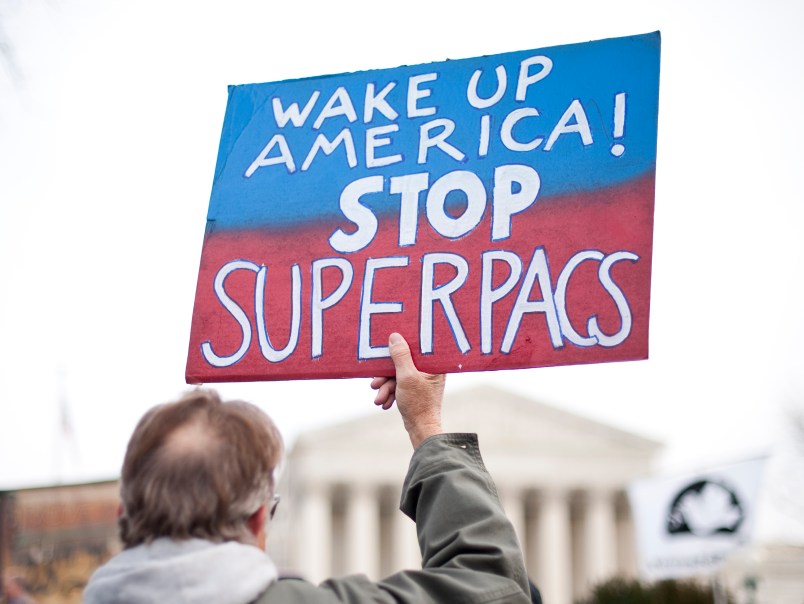Yesterday, the U.S. Court of Appeals in Washington ruled 11-0 that a ban on federal campaign contributions by individuals who contract with the government is constitutional. After a wave of controversial decisions by Supreme Court that have unleashed a flood of big money into politics, this appeals court decision sends a clear message: Sometimes, more money in politics can be a very bad thing.
Americans agree. According to a poll from the New York Times, some 85 percent of the American people believe that the way political campaigns are funded needs either “fundamental changes” (39 percent) or “a complete rebuild” (46 percent).
Money has become central to American politics. Spending in the 2016 presidential election alone could top $4 billion, with the winning candidate having to raise $1.5 billion.
How did we get into this mess? In 1974, after the Watergate scandal brought down Nixon, Congress established limits on how much people could give and how much politicians could spend on their campaigns, and mandated disclosure to ensure that regular citizens could “follow the money.”
Unfortunately the Supreme Court blew a hole in the 1974 law right away. In Buckley v. Valeo, the Court eliminated campaign spending limits. With no limits, a fundraising arms race began which continues to this day.
Building on Buckley, John Roberts’ Supreme Court has largely gutted most of the post-Watergate reforms. In Citizens United v. FEC the Court not only struck down a law regulating independent expenditures but it also freed up corporations to spend unlimited money directly to influence elections. In McCutcheon v. FEC it voided aggregate contribution limits to federal candidates, ruling that the $123,000 cap on how much one individual could contribute violated the First Amendment. Both decisions were done under the belief that the use of money for political purposes is protected speech.
The Supreme Court has not acted alone. Candidates and special interest groups have exploited legal ambiguities and used tax-exempt non-profit legal shells for political purposes to escape contribution limits and disclosure rules. Groups are challenging other laws, anticipating that the Roberts Court will eventually strike them down, too.
The result is twofold. First, groups and candidates are flouting any remaining regulations, leading to a dramatic growth in unregulated and undisclosed spending, especially since Citizens United.
Second, special interest money has pushed the Democrats to the left and Republicans to the right, preventing bipartisan problem-solving on issues across the board.
So can anything be done?
Actually, yes. All hope is not lost. And yesterday’s court decision is a step in the right direction. America need not wait for Congress or the Supreme Court to come around. The president and various federal agencies have the power to make several small but important reforms. Here are four:
1) The president could issue an executive order to require federal contractors to disclose all political contributions they make and to bar contractors from bidding on federal contracts for two years if they spend too much to influence a federal race or a member of Congress.Yesterday’s ruling upholds a ban on individual “pay to play” contributions to prevent conflicts of interest or undue influence. A new order could build on that ruling.
2) The Securities and Exchange Commission could make a rule requiring publicly traded companies to disclose all expenditures of money for political purposes and to obtain shareholder assent to use money for these purposes.
3) To reduce candidates’ need for costly commercials, the Federal Communications Commission could issue require that broadcasters to provide reasonable free air time to all House, Senate, and Presidential candidates. The public owns the airwaves, so there is nothing to stop the FCC from doing this.
4) The IRS could require that non-profits whose major purpose is political advocacy register with the FEC and disclose their donors and expenditures.
These reforms are not enough, but they show that something can be done now—and they would give us the tools we need to better understand the money flooding our political system. That knowledge is a critical first step that will build the case for overturning Buckley and Citizens, and, ultimately, healing our democracy.
David Schultz is a professor of political science at Hamline University in Minnesota and a member of the Scholars Strategy Network.







Amen to all four, but I would add a fifth: Require all entities with religious exemptions to report any and all political contributions, or better yet, bar them from making those contributions. If they want to be political, then they need to register as poitical. I’m tired of religion being injected into politics.
I have very strong religious beliefs and very strong political beliefs, but I don’t preach religion in a bar and I don’t preach poltics at church.
You forgot to add that they should also lose their 501©3 status.
Hell, I think all churches should lose that status anyway. After all, they are businesses. They just happen to be selling “Blue Sky.”
RE: “special interest money has pushed the Democrats to the left”
I haven’t seen much influence of The Left on Obama’s policies.
As a candidate, he supported the 2008 bank bailout without concrete salary limits or cramdown.
As president, he didn’t demand a public option in the Obamacare bill. He did get the unpopular individual mandate. Also, the “Cadillac Tax” which unions opposed.
He hasn’t tried to bring back Glass-Steagall. He’s trying to pass the TPP.
How hard is it proofread? “3) To reduce candidates’ need for costly commercials, the Federal Communications Commission could issue require that broadcasters to provide reasonable free air time to all House, Senate, and Presidential candidates. The public owns the airwaves, so there is nothing to stop the FCC from doing this.”
For the most part all that needs to be done is for the IRS, yes that IRS, to enforce the laws about “religious” entities not speaking politics from the pulpit… bet anyone could guess just how far that would go…